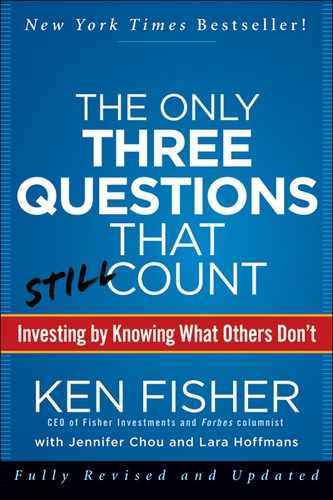The Great Humiliator’s Favorite Tricks
If we were more evolved as investors, perhaps TGH would be reclassified as “The Mild Humiliator” (TMH) or even “The Softer, Gentler and Kinder Trickster” (TSGKT). Our preconditioning keeps us repeatedly humiliated by the market through psychological tendencies we fall for over and over again. Unfortunately, and as mentioned before, our biases don’t work alone—they work in concert with each other, making completely nonsensical investment decisions seem rational even while we commit them. Your brain won’t tell you when you’re making a stupid mistake because it doesn’t think the cognitive errors you make are stupid. Rather, your brain tells you the investments “just didn’t work out.” And then you look for something to blame it on—regret shunning.
Your only weapon is Question Three—with every decision you make, ask: What the heck is my brain doing to lead me astray this time? The more sane and rational a decision may seem, the more important it is to ask. I’ve given you some examples already of your brain working against you, and I give you more later in this book. You can make a list of them and keep it by your desk or nightstand. But you must keep asking yourself the question with every decision: What is my brain doing to blindside me now?
Consider the following hypothetical (though very plausible) scenario with an investor we’ll call Jim. See if you’ve ever made similar decisions.
Let’s say Jim’s overall portfolio has risen 50% over the past three years. That’s a pretty believable result after a few bull market years. Then a market correction hits and the portfolio drops 18% over several months. Corrections are perfectly normal in a bull market—expect one every year or two. They happen in history more years than not. Jim knows this and realizes the markets are volatile and knows markets can correct 10% to 20% in a jiffy and still move on to higher prices. He knows he has a long time horizon and short-term moves don’t matter much. Even so, when it happens to him, it feels terrible. Just terrible!
First—myopic loss aversion. That 18% loss feels more like 45%. He’s about as miserable about his short-term 18% loss as he is happy about the gains of recent years. (The more recent and the short term are the myopic part of myopic loss aversion. We tend to weigh the short term more than the long term despite the fact that eventually it’s the long term we end up with.) Jim starts thinking about doing something to stop this (myopic) pain. If Jim asked himself Question Three, maybe he could have stopped the downward spiral of the rest of this scenario. He would have recognized myopic loss aversion was making him consider selling at a terrible time—in midst of what’s likely a correction. Unfortunately, Jim didn’t buy this book, and his Stone Age brain took over.
Next—order preference. He notices some of his stocks are down—way down. He overlooks that overall, even in the midst of this correction, his whole portfolio is still up over 20%. He fixates on a few of his stocks that are down over 40%. He has one, XYZ, that is down 65%. He thinks his life would be so much better if he hadn’t bought XYZ. Poker buddies tell him it’s probably going lower. It eats at him. He has a few stocks still up 80% or more. Those stocks are so much better. Why did he ever buy that turkey XYZ—down 65%? Why didn’t he buy more of the ones up 80%?
Then—regret shunning. He should never have delegated these decisions to a broker since he could have done a better job if he had been paying attention.
Then—confirmation bias and more regret shunning. The last stock he picked himself immediately rose 50%. At least this XYZ isn’t his fault. He wouldn’t have allowed a stock to be down 65% if the decision was his alone. This is the idiot broker’s fault. Jim is a smart cookie.
Followed closely by—hindsight bias. He knew XYZ was no good when the broker pitched it. He was going to pass on it and buy one currently up 140% and knew that was what he should have done. He just wasn’t paying attention. He should follow his instincts more often since he tends to be right about this stuff. But then why does he feel so bad?
More loss aversion. If he doesn’t do something soon, his wife may mistakenly think Jim is the idiot instead of the broker.
Next up—overconfidence. Forget that idiot broker. Though Jim has no background in finance or capital markets, he knows he can do it better. He was smart enough to get through medical school, after all. What’s the difference? If you’re smart, you’re smart. And Jim is really, really, really smart.
Jim has had it. He can’t take the pain of being down 18%, or the greater indignity of having that XYZ dog down 65%, so he sells every stock down over some arbitrary time period or maybe just every stock down more than some arbitrary amount. Two weeks later, the entire market and the stocks Jim sold finish correcting and are trading higher than before. And Jim is sitting with about 40% of his liquid net worth in cash. He tries to think about medical things and doctoring and his upcoming vacation and anything but the market.
Jim would currently be a wealthier man had he (1) asked Question Three or (2) made no decisions at all and (3) recognized his brain was trying to protect him from attack by a saber-toothed tiger, not guide him toward rational investing decisions. Meanwhile our smart doctor, in other realms a scientist, learns nothing from his cognitive mistakes as he shuns regret. “At least I didn’t lose more,” he tells himself. And he lives to repeat these errors and more another day.
